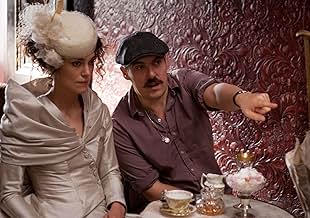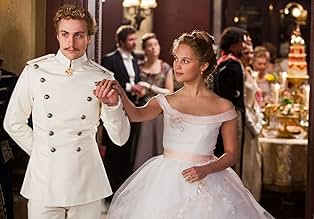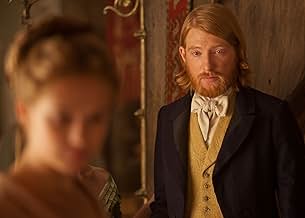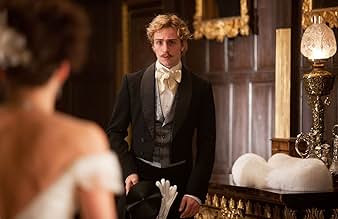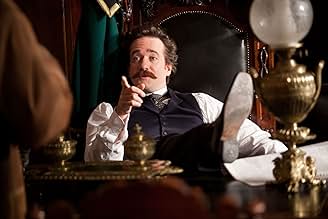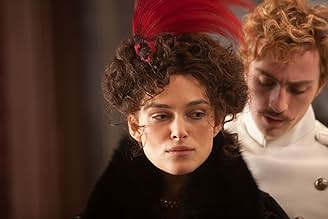In der russischen High Society des ausgehenden 19. Jahrhunderts beginnt die Petersburger Adelige Anna Karenina eine lebensverändernde Affäre mit dem schneidigen Graf Alexei Vronsky.In der russischen High Society des ausgehenden 19. Jahrhunderts beginnt die Petersburger Adelige Anna Karenina eine lebensverändernde Affäre mit dem schneidigen Graf Alexei Vronsky.In der russischen High Society des ausgehenden 19. Jahrhunderts beginnt die Petersburger Adelige Anna Karenina eine lebensverändernde Affäre mit dem schneidigen Graf Alexei Vronsky.
- Regie
- Drehbuch
- Hauptbesetzung
- 1 Oscar gewonnen
- 33 Gewinne & 54 Nominierungen insgesamt
Empfohlene Bewertungen
This adaptation of Anna Karenina is a very flat adaptation of one of the greatest pieces of literature, but actually it is not only a failure as an adaptation but disappointing also on its own merits. It is not without its redeeming qualities of course, the costumes and sets are gorgeous and some of the best of the year, the music is beautifully composed, Jude Law is a superbly restrained and dignified Karenin and Matthew Macfadyen and Domhnall Gleeson are similarly excellent as Stiva and Levin respectively. Keira Knightley in the title role however didn't do it for me. She tries but comes across as too young and too selfish, and I also didn't care at all for her over-earnest mannerisms. The weak link of the cast is the woeful miscast that is Aaron Taylor-Johnson's Vronsky, often too moody and wooden as well as too effeminate and foppish, so much so it comes across as creepy. The script is very stilted and lacking in any kind of heart. There is a lot of melodrama as well but it comes across as forced, while the switching from play-within-a-play to film is confusing. The story similarly suffers from pedestrian pacing and the drama and characters are too thin to make us properly care and that is including Anna, whose attempts to overcome her suffering is entirely too trivialised here. Even bigger of a problem was Joe Wright's direction, I loved Pride and Prejudice and especially Atonement so I hoping a similar kind of directing job. But Wright often seems to be paying attention to himself too much, with the camera work too incongruous and surreal. Everything, from the gimmicky theatrical elements to the ball scene where the dancing is so robotic and where you don't have a clue what dance style it's supposed to be, plays too much of an overblown musical but without song and dance. In conclusion a disappointment even on its own, for me a beautiful bore is a very apt summing up as to how I felt about it. See the Greta Garbo and Vivien Leigh films instead. 4/10 Bethany Cox
The lead virtue - Jude Law as Karenin. The worst sin - the mixture of pieces from everywhere for create the atmosphere. The theater is a nice idea but only better used . Virtues - the portraits of Levin and Kitty. Problems - a not reasonable Vronski and imposibility to feel the drama of Karenina. Short. It is a film without soul. Images, inacuracy, a kitsch Russia and a sort of "ad usum Delphini" adaptation. Too noisy, too vulgar, using the not inspired actor for Vronsky and proposing a hard fight to Keira Knightley for create her Karenina. Short, a film without purpose. And that is all.
I adore the novel, so I will be discussing Joe Wright's take on it and where it ranks amongst other adaptations but I will of course look at its merits as a film aside from the novel.
As a whole adaptation, this version falls somewhere in the middle. Even without all the metatheatrical trappings, it still took an interesting and valid approach to the novel, proving that the novel could be adapted until infinity and it would still be fresh each time. As readers of the novel would know, there is much more to it than Anna's affair. Tolstoy did not write vague types: he wrote fully-fleshed characters, and Tom Stoppard's screenplay acknowledged Tolstoy's style. Therefore I don't want to condemn the film outright because that would overshadow the things that it does get right.
Keira Knightley's version of Anna is not nearly as bad as you would think. She has the sense to restrain herself a little so that the many other elements of the novel shine through. She goes for the unsympathetic approach and it works. All her mannerisms that I generally find annoying- the schoolgirl smirking and rampant nymphomania- actually work for this role. This Anna takes Vronsky just because she can, and then ultimately regrets it. We can feel her frustration: she's young and wants to have fun but she's tied down to a stuffy older husband. In that sense, it's quite a modern interpretation, but not hideously so.
Aaron Taylor-Johnson as Count Vronsky was just miscast. If the novel had been about Anna seducing a schoolboy, he would have been great, but Vronsky is meant to be a dashing man. The styling is atrocious- he looks like a seventies Scandinavian Eurovision entry. Wright seems to have told some of the actors to act realistic and some to play up to the stylised setting. Taylor-Johnson plays the artifice so much that he just comes off as camp and sleazy. The scene where he is about to ride Frou Frou is like a production of Equus and there's a love scene with Keira Knightley that brought to mind an old advert for Philadelphia cheese. Their revelation of love is also poorly dealt with. Anna has some kind of fantasy dream where the two have an "erotic ballet" and suddenly they're banging away, presumably now in the real world.
Jude Law as Karenin. A bizarre choice when he could have played Vronsky five years ago and might even get away with it now at a push. However, he gives a performance that is probably his best. His Karenin is a bureaucrat through and through. Other adaptations have still made Karenin an attractive option. This Karenin is certainly not going to develop any great passion soon. We also see how he is manipulated by moral guardian Countess Lydia. If Law is trying to make a reputation as a serious actor, he's on the right path.
And what about all that pretentious theatre stuff? It seriously slows down the pace in the first third but once you get used to it, you can just enjoy the film. The ending is rather abrupt (no, that famous ending is not the last scene) but quite poignant.
As a whole adaptation, this version falls somewhere in the middle. Even without all the metatheatrical trappings, it still took an interesting and valid approach to the novel, proving that the novel could be adapted until infinity and it would still be fresh each time. As readers of the novel would know, there is much more to it than Anna's affair. Tolstoy did not write vague types: he wrote fully-fleshed characters, and Tom Stoppard's screenplay acknowledged Tolstoy's style. Therefore I don't want to condemn the film outright because that would overshadow the things that it does get right.
Keira Knightley's version of Anna is not nearly as bad as you would think. She has the sense to restrain herself a little so that the many other elements of the novel shine through. She goes for the unsympathetic approach and it works. All her mannerisms that I generally find annoying- the schoolgirl smirking and rampant nymphomania- actually work for this role. This Anna takes Vronsky just because she can, and then ultimately regrets it. We can feel her frustration: she's young and wants to have fun but she's tied down to a stuffy older husband. In that sense, it's quite a modern interpretation, but not hideously so.
Aaron Taylor-Johnson as Count Vronsky was just miscast. If the novel had been about Anna seducing a schoolboy, he would have been great, but Vronsky is meant to be a dashing man. The styling is atrocious- he looks like a seventies Scandinavian Eurovision entry. Wright seems to have told some of the actors to act realistic and some to play up to the stylised setting. Taylor-Johnson plays the artifice so much that he just comes off as camp and sleazy. The scene where he is about to ride Frou Frou is like a production of Equus and there's a love scene with Keira Knightley that brought to mind an old advert for Philadelphia cheese. Their revelation of love is also poorly dealt with. Anna has some kind of fantasy dream where the two have an "erotic ballet" and suddenly they're banging away, presumably now in the real world.
Jude Law as Karenin. A bizarre choice when he could have played Vronsky five years ago and might even get away with it now at a push. However, he gives a performance that is probably his best. His Karenin is a bureaucrat through and through. Other adaptations have still made Karenin an attractive option. This Karenin is certainly not going to develop any great passion soon. We also see how he is manipulated by moral guardian Countess Lydia. If Law is trying to make a reputation as a serious actor, he's on the right path.
And what about all that pretentious theatre stuff? It seriously slows down the pace in the first third but once you get used to it, you can just enjoy the film. The ending is rather abrupt (no, that famous ending is not the last scene) but quite poignant.
It took me about an hour to stop being irritated by the movie's self consciousness, to sort of enjoy it... but the damage was done.
As viewers, we have no reason to believe in the love Anna finds. He is creepy and give us no inkling of why she might ruin her life for him.
Kiera isn't bad, just annoying, considering we have no empathy for her self indulgence. If her husband was worse, her love a lot nicer, and if we could feel electricity between them, it would be a different matter, but the fact is the movie is too busy being clever... it misses out on having a heart and soul.
The theatre gimmick got in the way, and seemed like a cheap way of having Moscow backdrops without actually traveling there.
5/10
As viewers, we have no reason to believe in the love Anna finds. He is creepy and give us no inkling of why she might ruin her life for him.
Kiera isn't bad, just annoying, considering we have no empathy for her self indulgence. If her husband was worse, her love a lot nicer, and if we could feel electricity between them, it would be a different matter, but the fact is the movie is too busy being clever... it misses out on having a heart and soul.
The theatre gimmick got in the way, and seemed like a cheap way of having Moscow backdrops without actually traveling there.
5/10
Remember that scene early in Inception where Leonardo di Caprio and Ellen Page are sitting at a sidewalk cafe as he explains how his dream technology works? He points out that in a dream you never question the time, place, or circumstances in which you find yourself, you just accept them as normal. Suddenly windows start exploding, pavement buckles, the streets of Paris start curving over their heads, and you realize that the entire sequence has played out just the way he described it. You, sitting in the audience, never questioned how they got to that cafe in the 1st place, you just took it for granted.
The reason Christopher Nolan was able to pull this off so deftly was that we bring the same short-cut sensibility with us to the movies. We see a person in an office, a taxi, a restaurant, and an apartment in quick succession but don't want to be bored with the tedium of actually getting from one of those locales to the next, so we gladly accept the cinematic convention of just jump-cutting from scene to scene.
The most recent (of many) productions of Anna Karenina, Leo Tolstoy's classic novel of a high-society scandal in doomed imperial Russia circa 1890, reveals some of this artifice to the inquisitive eye. Much of the film appears to be set on an actual theater stage, but characters walk on and off that stage to what appears to be the real world — or saunter backstage to have it turn into a train station. Much of it is stilted and artificial — such as all the other dancers freezing in position during the Platonic ideal of a ballroom waltz (with heavy swing-dance styling), as Anna and Vronsky swirl among them. The extent of privilege of the Russian noble classes is underlined by the way in which the various counts and dukes just casually hold out a hand, expecting out of habit that a drink or the next piece of paperwork will be instantly placed there by an obsequious lackey, or holding out an arm while doing a 360, never questioning that the office suit coat will be removed by the left-hand lackey while the evening jacket is being simultaneously slipped on by the right-hand one. And director Joe Wright cuts the audience no expositional slack whatsoever in introducing the characters or keeping their various nicknames straight (and Russians have lots of nicknames); you just have to pick up who's who on your own.
The costuming is sumptuous and seems a lock for this year's Oscar in that category. However, I was bemused that, shortly after leaving the Sundance Theater, I swung by the Middleton Marriott to drop off some fliers at TeslaCon, a steampunk immersion convention, and found myself walking into the kind of artificial environment Wright had created, with congoers all self-costumed nearly as well as the best Hollywood could produce.
All of this style and metapresentation comes at a price, however, and the price is the humanity of the characters. Due to the mode of presentation, we can never suspend our disbelief long enuf to start thinking of them as real people; they remain actors in a play, and we're never allowed to forget it.
Keira Knightley is radiant as Anna, and Jude Law is agonizingly prim, principled, and earnest as Karenin (and we can't help but feel serious empathy for him, despite learning that his parliamentary maneuverings represent the worst form of bigotry), but I was disappointed in Aaron Taylor-Johnson as Vronsky. He seemed too effete and foppish and not nearly dashing enuf to win Anna's heart at first glance. But then, as he remarked, "you can't ask why about love."
This version of AK will certainly be remembered more for its staging than for its story. Perhaps that's excusable, since the story has been told so many times before, and often well and beautifully, but it's a shame that we were reduced to thinking of it as a necessary nuisance getting in the way of the stagecraft.
The reason Christopher Nolan was able to pull this off so deftly was that we bring the same short-cut sensibility with us to the movies. We see a person in an office, a taxi, a restaurant, and an apartment in quick succession but don't want to be bored with the tedium of actually getting from one of those locales to the next, so we gladly accept the cinematic convention of just jump-cutting from scene to scene.
The most recent (of many) productions of Anna Karenina, Leo Tolstoy's classic novel of a high-society scandal in doomed imperial Russia circa 1890, reveals some of this artifice to the inquisitive eye. Much of the film appears to be set on an actual theater stage, but characters walk on and off that stage to what appears to be the real world — or saunter backstage to have it turn into a train station. Much of it is stilted and artificial — such as all the other dancers freezing in position during the Platonic ideal of a ballroom waltz (with heavy swing-dance styling), as Anna and Vronsky swirl among them. The extent of privilege of the Russian noble classes is underlined by the way in which the various counts and dukes just casually hold out a hand, expecting out of habit that a drink or the next piece of paperwork will be instantly placed there by an obsequious lackey, or holding out an arm while doing a 360, never questioning that the office suit coat will be removed by the left-hand lackey while the evening jacket is being simultaneously slipped on by the right-hand one. And director Joe Wright cuts the audience no expositional slack whatsoever in introducing the characters or keeping their various nicknames straight (and Russians have lots of nicknames); you just have to pick up who's who on your own.
The costuming is sumptuous and seems a lock for this year's Oscar in that category. However, I was bemused that, shortly after leaving the Sundance Theater, I swung by the Middleton Marriott to drop off some fliers at TeslaCon, a steampunk immersion convention, and found myself walking into the kind of artificial environment Wright had created, with congoers all self-costumed nearly as well as the best Hollywood could produce.
All of this style and metapresentation comes at a price, however, and the price is the humanity of the characters. Due to the mode of presentation, we can never suspend our disbelief long enuf to start thinking of them as real people; they remain actors in a play, and we're never allowed to forget it.
Keira Knightley is radiant as Anna, and Jude Law is agonizingly prim, principled, and earnest as Karenin (and we can't help but feel serious empathy for him, despite learning that his parliamentary maneuverings represent the worst form of bigotry), but I was disappointed in Aaron Taylor-Johnson as Vronsky. He seemed too effete and foppish and not nearly dashing enuf to win Anna's heart at first glance. But then, as he remarked, "you can't ask why about love."
This version of AK will certainly be remembered more for its staging than for its story. Perhaps that's excusable, since the story has been told so many times before, and often well and beautifully, but it's a shame that we were reduced to thinking of it as a necessary nuisance getting in the way of the stagecraft.
Wusstest du schon
- WissenswertesOne of Alicia Vikander's favorite experiences from the production was the filming that took place in the countryside outside of St. Petersburg, Russia. The temperatures dropped below -40 °C, and she stayed in a cabin for five days that didn't have hot water and only featured benches instead of beds. Meanwhile, Russian security guards protected her and co-star 'Domhnall Gleeson' from wild wolves and bears that dominated the deserted area.
- PatzerThe label of the bottle of morphine Anna drinks from changes from "la Morphine" to "Morphine" between shots. The only correct French form would be without an article (prescriptions would have been written in Latin in 19th-century Russia anyway).
- VerbindungenFeatured in Projector: Anna Karenina (2012)
- SoundtracksSong for a New Life (Masha's Song)
(uncredited)
Written by Anoushka Shankar
Performed by Tannishtha Chatterjee
Top-Auswahl
Melde dich zum Bewerten an und greife auf die Watchlist für personalisierte Empfehlungen zu.
- How long is Anna Karenina?Powered by Alexa
Details
- Erscheinungsdatum
- Herkunftsländer
- Offizieller Standort
- Sprache
- Auch bekannt als
- Chuyện Tình Anna
- Drehorte
- Kizhi, Karelia, Russland(on location)
- Produktionsfirmen
- Weitere beteiligte Unternehmen bei IMDbPro anzeigen
Box Office
- Budget
- 40.600.000 $ (geschätzt)
- Bruttoertrag in den USA und Kanada
- 12.816.367 $
- Eröffnungswochenende in den USA und in Kanada
- 320.690 $
- 18. Nov. 2012
- Weltweiter Bruttoertrag
- 68.929.150 $
- Laufzeit2 Stunden 9 Minuten
- Farbe
- Sound-Mix
- Seitenverhältnis
- 2.35 : 1
Zu dieser Seite beitragen
Bearbeitung vorschlagen oder fehlenden Inhalt hinzufügen








